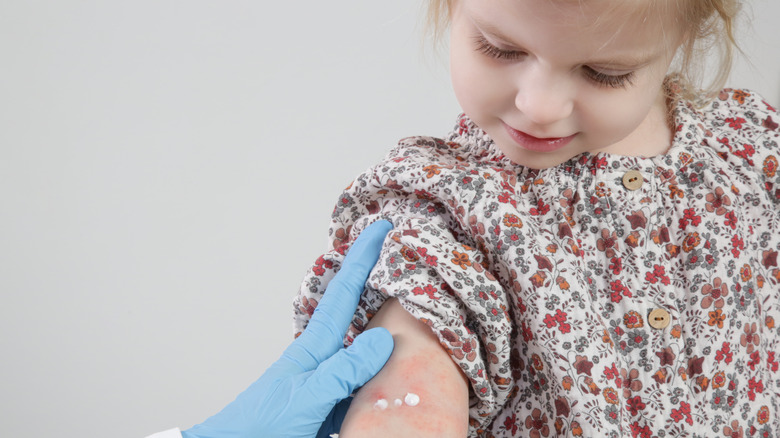This Atopic Dermatitis Medication Just Got FDA-Approval For Use In Young Kids
Characterized by itching, discoloration, and the emergence of sores or scaly patches on the skin's surface, roughly 13% of American children are diagnosed with atopic dermatitis, per the National Eczema Association. As a chronic form of eczema, atopic dermatitis often emerges early on, developing on the elbows, knees, or face of young babies or in between the hands, knees, or folds of the elbows in older kids.
Topical products, light therapy, or immunosuppressant medications are all treatment methods commonly used to reduce symptoms in those with this inflammatory skin condition (via National Eczema Association). Using proteins extracted from live cells or tissue, biologic drugs are also used to treat atopic dermatitis. These genetically modified medications are designed to inhibit the body's inflammatory immune response (per National Eczema Association). One such drug, Dupixent, has previously been approved for use in those ages 6 and older, according to Medical News Today. Now, the U.S. Food and Drug Administration (FDA) has expanded the drug's approved usage to include those between 6 months old and 5 years of age.
How Dupixent compares to topical steroids for young kids
Results of a clinical trial revealed that atopic dermatitis patients treated with Dupixent in combination with topical corticosteroids (TCS) experienced greater improvements in symptoms of itchiness and skin clarity over those treated solely with the topical products, as per a press release issued by drug manufacturing company Sanofi.
Specifically, research data showed that 28% of patients given both Dupixent and TCS had their skin clear up entirely or almost entirely by the end of the study (via Sanofi). In contrast, 4% of patients treated only with TCS saw results. Additionally, nearly half of those given Dupixent and TCS noted a significant drop in itchiness, compared to only 9% of those given TCS only. Side effects experienced by the 6 months to 5-year-old age group proved to be mild.
Given as an injection once a month, experts are optimistic about the drug as a safe alternative to topical steroids for children, which have been associated with potential long-term health risks (per Sanofi). "We're pleased to see how scientific innovation and research continues to address unmet needs for the atopic dermatitis community, and we're hopeful for the positive impact Dupixent can have for these children and their families," said President and Chief Executive Officer of the National Eczema Association, Julie Block, in the company's news release.


